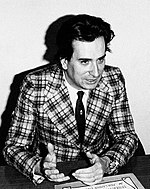About Paolo Portoghesi
- Paolo Portoghesi (born 2 November 1931, Rome) is an Italian architect, theorist, historian and professor of architecture at the University La Sapienza in Rome.
- He is a former President of the architectural section of the Venice Biennale (1979–92), Editor-in-chief of the journal Controspazio (1969–83), and dean of the Faculty of Architecture at the Politecnico di Milano university (1968–78).
- Portoghesi studied architecture at the Faculty of Architecture at the University of Rome, completing his studies in 1957.
- He began teaching the history of criticism at the same faculty in 1961.
- Portoghesi opened an architectural practice with architect-engineer Vittorio Gigliotti (born 1921) in Rome in 1964. He has specialized in teaching and researching Classical architecture, especially Baroque architecture, and in particular Borromini, but also Michelangelo.
- His interest in more contemporary architecture coincided largely with that of his colleague in Rome, Bruno Zevi, in championing a more organic form of modernism, evident in, for instance, the work of Victor Horta and Frank Lloyd Wright, and in Italy with neorealism and the Neo-Liberty style.
- This attitude has continued throughout Portoghesi's career, and is clearly visible in his own architecture.
- It is also evident in his concern for the studies of nature, brought to the fore in his more recent book Nature and Architecture (2000).
Read more at Wikipedia
See Also
- Famous People's Birthdays on 02 November, Italy
- Famous People's Birthdays in November, Italy
- Famous screenwriter's Birthdays on 02 November, Italy
- Famous screenwriter's Birthdays in November, Italy
- Famous architect's Birthdays on 02 November, Italy
- Famous architect's Birthdays in November, Italy
- Famous art historian's Birthdays on 02 November, Italy
- Famous art historian's Birthdays in November, Italy


 Date of Birth:
Date of Birth:  Place of Birth: Rome, Lazio, Italy
Place of Birth: Rome, Lazio, Italy